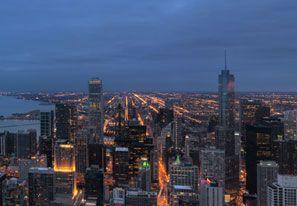
Chicago’s Loop hums with life and commerce today. A parade of companies, including Kraft and Motorola, has moved from the suburbs into the central business district. The greater downtown apartment market is booming, with thousands of new units being constructed. Chicago hotels will add 2,200 new hotel rooms this year to accommodate throngs of tourists. The city has rolled out new amenities and attractions, including an enhanced Riverwalk along the once-polluted Chicago River, and Maggie Daley Park, a fantasy-like playground that replaced the forlorn Daley Bicentennial Plaza section of Grant Park. Also opening this year: a long-anticipated elevated rail trail and a new nature preserve on Northerly Island.
With so much civic and commercial activity, Chicago seems to be going from strength to strength. Sipping wine on the Riverwalk while watching the architectural tour boats cruise by, one struggles to reconcile Chicago’s seeming vitality with headlines such as, FIVE REASONS CHICAGO IS IN WORSE SHAPE THAN DETROIT. That seems preposterous, considering Detroit’s recent bankruptcy, not to mention its largely empty, windswept streets, abandoned buildings, and mile upon mile of so-called “urban prairie.” Most cities would kill for Chicago’s level of urban growth. But despite its many advantages—including America’s second-largest central business district, several elite universities, and a major regional airport—the Windy City is a fiscal basket case.
In May, the Illinois Supreme Court’s unanimous rejection of state legislators’ attempt to enact pension reform, along with Moody’s downgrade of the city’s debt to junk status, triggered a cascade of problems requiring painful decisions. First up is a 1 percentage-point increase in the Cook County sales tax, bringing Chicago’s combined state, county, and city sales tax to the highest in the nation at 10.25 percent. Mayor Rahm Emanuel is also hiking property taxes, something he spent four years trying to avoid. He proposes a $600 million increase to help the city start making required pension payments. He also wants to put a stop to so-called “scoop-and-toss” debt refinancing—the practice of paying off maturing debt obligations with sales of new long-term bonds. Emanuel plans to exempt homeowners with properties below the median value from the tax increase, but getting permission from the state could be difficult. He’s also raising an array of other taxes and fees, ranging from a new garbage-collection charge to a so-called “cloud tax” on online-streaming services such as Netflix.
More problems lie ahead. The city’s public school system has a $500 million budget hole and may run out of money this year. Illinois has its own massive pile of liabilities to deal with, and Republican governor Bruce Rauner and the Democrats in the state legislature haven’t agreed on a budget. These factors make the city dangerously dependent on special deals to keep the money flowing. The Riverwalk was financed with a federal loan that must be repaid. The elevated-rail trail was made possible by a federal grant, private dollars, and only $5 million of city money. Such financial gymnastics will become progressively more difficult to pull off, constraining Chicago’s ability to invest in infrastructure.
The start of what’s likely to be a rolling series of tax increases is bad news for residents and businesses. But if the city and state bite the bullet now and deal with their structural problems, they could foster a more stable investment climate. Once the cloud is lifted and the true cost of running Chicago and Illinois is known, the Windy City will find out what its economy is really made of.
Chicago’s troubles are a lesson in what happens to cities and states when they ignore financial realities. The blame goes to Illinois’s bipartisan system—dubbed the “Combine” by Chicago Tribune columnist John Kass—of clout and cronyism, powerful and self-interested public-employee unions, a business community happy to go along to get along, and residents who’ve known what’s going on but kept voting for the same people and the same spendthrift politics. It’s said of financial crises that they take much longer to arrive than you think and unfold more rapidly than you ever believed possible. People have been saying “the bills are coming due” in Chicago for a long time—and now it’s finally true.